|
|
|
Sort Order |
|
|
|
Items / Page
|
|
|
|
|
|
|
| Srl | Item |
| 1 |
ID:
112079


|
|
|
|
|
| Publication |
2012.
|
| Summary/Abstract |
Despite attempts over the last decade to bring an end to what has become an 'arms race' between political parties, party funding in the UK continues to defy resolution. Drawing on the experience of the committee charged by the last Labour administration to put party funding and electoral spending on a more sustainable footing, this article examines the issues and the main sticking points. It outlines the basis on which the negotiations were undertaken, and the main hurdles they sought to overcome. It highlights the disagreement between the parties on the definition of the central issue, the problems associated with the main funding sources for each of the parties, and the viability of state funding. It discusses why success proved elusive, but also why a solution is necessary, since in the absence of robust rules, parties and therefore the UK political system more broadly, are 'a hostage to the next scandal'.
|
|
|
|
|
|
|
|
|
|
|
|
|
|
|
|
| 2 |
ID:
120404


|
|
|
|
|
| Publication |
2013.
|
| Summary/Abstract |
This article examines the impact of the "BBK" scandal on the 2007 Korean presidential election. Voters continue to support the "corrupt" candidate after the scandal, treating it as just one of the determinants for vote choice. The findings show that the implicit trading thesis applies to Korean presidential elections.
|
|
|
|
|
|
|
|
|
|
|
|
|
|
|
|
| 3 |
ID:
164955
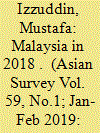

|
|
|
|
|
| Summary/Abstract |
After decades of rule by the Barisan Nasional, spearheaded by the United Malays National Organisation, 2018 witnessed a change in government when the Pakatan Harapan opposition secured a stunning victory in the general election. The incumbent prime minister, Najib Razak, was defeated by his political nemesis, Mahathir Mohamad. Malaysia’s economy was stable but sluggish, growing slower than expected in 2018.
|
|
|
|
|
|
|
|
|
|
|
|
|
|
|
|
| 4 |
ID:
187029
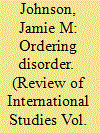

|
|
|
|
|
| Summary/Abstract |
This article offers insights into the character and composition of world order. It does so by focusing on how world order is made and revealed through seemingly disorderly events. We examine how societies struggle to interpret and respond to disorderly events through three modes of treatment: tragedy, crisis, and scandal. These, we argue, are the dominant modes of treatment in world politics, through which an account of disorder is articulated and particular political responses are mobilised. Specifically, we argue that each mode provides a particular way of problematising disorder, locating responsibility, and generating political responses. As we will demonstrate, these modes instigate the ordering of disorder, but they also agitate and reveal the contours of order itself. We argue, therefore, that an attentiveness to how we make sense of and respond to disorder offers the discipline new opportunities for interrogating the underlying forces, dynamics, and structures that define contemporary world politics.
|
|
|
|
|
|
|
|
|
|
|
|
|
|
|
|
| 5 |
ID:
138859


|
|
|
|
|
| Summary/Abstract |
Conventional wisdom holds that democratic governments listen to their populations, while authoritarian governments do not. This paper questions the extent to which this dynamic applies in cases of government scandals, using the illustrative cases of China and Kenya. We expect democratic countries with free media to be responsive and authoritarian states to ignore public pressure. Counter to this expectation, however, authoritarian China is more responsive to public pressure to clean up scandals than democratic Kenya. Using case studies and quantitative analysis, we argue that while democracy and free media are important for government responsiveness to scandal, they are neither necessary nor sufficient conditions. We assert that political will, state capacity to respond and high public expectations for state action are also necessary.
|
|
|
|
|
|
|
|
|
|
|
|
|
|
|
|
| 6 |
ID:
127979


|
|
|
| 7 |
ID:
172925


|
|
|
|
|
| Summary/Abstract |
This research note introduces the December 1981 report of the Security Commission. This report was never released with the main conclusions forming the basis of a statement by Prime Minister Margaret Thatcher, published in May 1982. But the 1981 report is significant for a number of reasons. It was the first major review of government security since the Radcliffe Report of 1961, resulting in a number of recommendations that changed government vetting for the rest of the 1980s. The report also recommended the avowal of Britain’s foreign intelligence agency – a recommendation that proved especially controversial.
|
|
|
|
|
|
|
|
|
|
|
|
|
|
|
|
| 8 |
ID:
081866


|
|
|
|
|
| Publication |
2008.
|
| Summary/Abstract |
South Korea in 2007 was rocked by a series of scandals and sensational news that eclipsed historical and contemporary struggles to shape economic growth and political democracy. The most important issue-the division of the Korean nation-continued to grab headlines. Although no resolution to the issue of national division seemed imminent, South Korea registered economic and political gains in 2007
|
|
|
|
|
|
|
|
|
|
|
|
|
|
|
|
| 9 |
ID:
115284
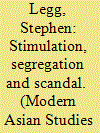

|
|
|
|
|
| Publication |
2012.
|
| Summary/Abstract |
This paper explores the regulation of prostitution in colonial India between the abolition of the Indian Contagious Diseases Act in 1888 and the passing of the first Suppression of Immoral Traffic Act in 1923. It challenges the commonly held assumption that prostitutes naturally segregated themselves in Indian cities, and shows that this was a policy advocated by the Government of India. The object was to prevent the military visiting these segregated areas, in the absence of effective Cantonment Regulations for registering, inspecting, and treating prostitutes. The central government stimulated provincial segregation through expressing its desires via demi-official memoranda and confidential correspondence, to which Rangoon and Bombay responded most willingly. The second half of the paper explores the conditions, in both India and Ceylon, that made these segregated areas into scandalous sites in the early twentieth century. It situates the brothel amongst changing beliefs that they: increased rather than decreased incidents of homosexuality; stimulated trafficking in women and children; and encouraged the spread of scandalous white prostitutes 'up-country', beyond their tolerated location in coastal cosmopolitan ports. Taken alongside demands that the state support social reform in the early twentieth century, segregation provided the tipping point for the shift towards suppression from 1917 onwards. It also illustrates the scalar shifts in which central-local relations, and relations between provinces, in government were being negotiated in advance of the dyarchy system formalized in 1919.
|
|
|
|
|
|
|
|
|
|
|
|
|
|
|
|
| 10 |
ID:
093117


|
|
|
| 11 |
ID:
132548
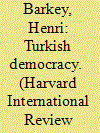

|
|
|
|
|
| Publication |
2014.
|
| Summary/Abstract |
Turkey's ruling Justice and Development Party (AKP), or in Turkish, Adalet ve Kalk?nma Partisi, came to power in late 2002 and went to win two more elections in 2007 and 2011, gaining a larger and larger share of the vote. No government since the 1950s had managed to achieve such a feat. A year ago, the AKP and Prime Minister Recep Tayyip Erdogan seemed poised to extend their dominance of Turkish politics for a decade or longer. A year later, however, in the aftermath of protests in early summer and a massive corruption scandal, uncertainty reigns. Erdogan and his party appear to have become unhinged. In fits of complete paranoia, they and their supporters have started to accuse everyone, especially Western allies and interests, for attempting to overthrow them.
Justice and Development Party - AKP
|
|
|
|
|
|
|
|
|
|
|
|
|
|
|
|
| 12 |
ID:
161495


|
|
|
|
|
| Summary/Abstract |
A succession of media scandals and policy arguments in the UK in recent years has been integral to the construction of a so-called ‘Muslim Problem’. Media and political attention paid to Muslims in British public life, across a vast and varied range of issues, suggests a social preoccupation that exceeds the security framing the ‘War on Terror’ once imposed. In this article, we develop and apply Slavoj Žižek’s Lacanian theory of ideology to produce an original conceptual and analytic framework centred on the social functions served by, as well as the co-constitution of, anxiety and fantasy. We then apply this framework to explore three scandals relating to child sexual exploitation, halal meat and education. We show that the representations of British Muslims that these scandals entail are best understood as ideological fantasies, mobilized to suture traumatic gaps and conceal contradictions in wider social practices around such issues. We argue that the unrelenting media and political focus on myriad aspects of British Muslims’ imagined lives is symptomatic of what Žižek calls an ‘unbearable anxiety’: Islamophobic ideological fantasies conjure a ‘conceptual Muslim’ to sidestep confrontation with the Lacanian ‘Real’ – antagonistic and anxiety-inducing structures and practices underpinning British society, of which we do not speak.
|
|
|
|
|
|
|
|
|
|
|
|
|
|
|
|
| 13 |
ID:
132078
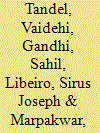

|
|
|
|
|
| Publication |
2014.
|
| Summary/Abstract |
In developing countries, separation of powers coexists with corruption by the ruling elite. This can be attributed to informal institutions, which counter the formal checks and balances. We demonstrate, by studying the Adarsh scam, the vulnerabilities of checks and balances. Fourteen actors belonging to different tiers of the Indian federal setup who could have vetoed the project or certain permissions failed to do so.We find that 54 percent of the checks collapsed because of quid pro quo, 21 percent due to being overridden, 4 percent due to misrepresentation, 7 percent due to absorption, and 14 percent due to omissions in the process.
|
|
|
|
|
|
|
|
|
|
|
|
|
|
|
|
|
|
|
|
|